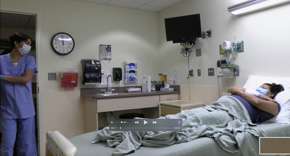
A week or two ago, I had a very interesting experience in my internship and I’m excited to share about it!
Getting Started in Anti-Human Trafficking Training
First of all, Give Way to Freedom is a privately run human trafficking task force that works to provide psychological and physical support to survivors of human trafficking and sex trafficking. These initiatives range on a variety of levels, one such thing they do is try and work to teach different institutions how to better address a victim of human trafficking, signs to be aware of and how to best support them. One great way they do this is through filming simulations of scenarios that different professionals might encounter in their careers. A few weeks ago, I got to be a part of one that was filmed for hospital staff to watch and learn from.
I was actually not expecting to be a part of the video, but it happened rather last second. The scenario was one of a Spanish speaking patient who came to a hospital with bruises that were from a situation of abuse and how that scenario might play out in a hospital. I was to be the Spanish-speaking janitor who was the only person in the hospital that had attempted to try and speak to the woman in Spanish and then grabbed the doctor to tell her that I was concerned for the patient’s safety. From there, the doctor was able to speak to the patient and offer her the help she might need.
The Importance of Anti-Human trafficking Training
This experience was especially powerful to me because it made me realize that we really need to make a better effort to have interpreters available in hospitals. The simulation was a pretty accurate depiction of what might actually happen in a hospital if you come in and do not speak English. In Vermont especially, there is not a lot of diversity among spoken languages but there is a very large migrant community that I feel deserves to be treated with the same comfort and understanding as a native English speaker. This simulation really made me realize how important and multifaceted the work of an organization like Give Way to Freedom is. We need to learn from these experiences and address them so that we can better support migrant communities in the US. Just because someone does not speak English, does not mean that they do not deserve to feel safe and comfortable in a hospital.
From this experience, I would really like to learn more about the ways in which language barriers are being addressed within hospitals in Vermont if there even are at all. I think this will be an incorporated goal for me for the rest of my internship and the rest of this semester.
